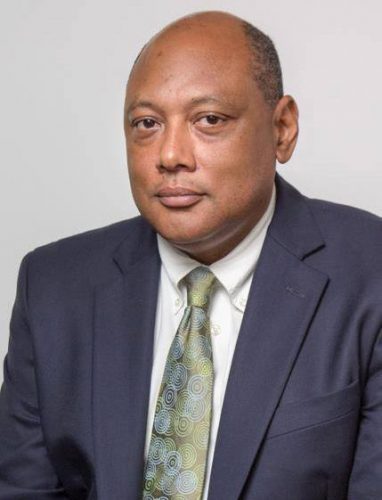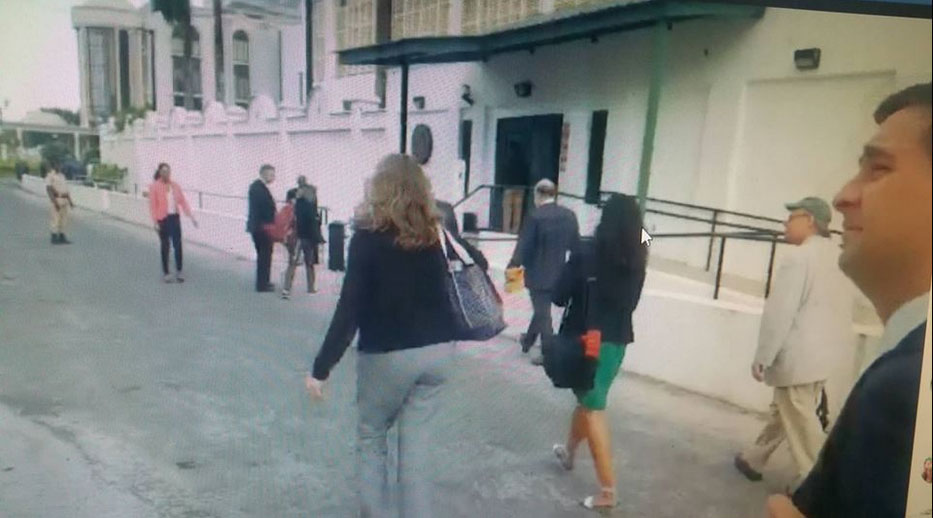A United States congressional and military delegation yesterday arrived in Guyana and held their first meeting with Minister of Natural Resources Raphael Trotman, a visit that government has been tightlipped on but has said is a “familiarisation” one.
Seven Republicans and two Democrats make up the team. Bob Goodlatte, John Rutherford, Mark Sanford, John Curtis, Todd Rokita, Richard Hudson, Steve Cohen, Scott Peters and Darrell Issa arrived after noon yesterday and are expected to leave the country today after holding other meetings.
Goodlatte and Hudson, both Republicans, are from Virginia. Rutherford represents Florida, Curtis – Utah, and Rokita – Illinois while Democrats Cohen and Peters are from Tennessee and California, respectively.

Republicans Sanford, Goodlatte and Issa won’t be returning to the House in November as Sandford recently lost the primary race in South Carolina to fellow Republican Katie Arrington while Issa retired in January of this year and Goodlatte announced his retirement last year.
Neither the government here nor the US embassy has made public any details on the reasons for the visit and reporters were yesterday barred from asking members of the delegation questions.
But this newspaper understands that the visit is to examine the current refugee crisis spawned by the situation in Venezuela and how it can impact the Caribbean region and neighbouring states.
Several of Guyana’s border regions – particularly Region One – has seen Venezuelans crossing the frontier seeking food, shelter and medical care. Around 500 Venezuelans entered the northwest recently and this has put a strain on the region’s ability to provide basic services. The government has stepped in and announced the creation of a homestead for the Venezuelans.
The US delegation leaves today for Brazil where they would also have similar talks with the government there on security and border matters. Several Brazilian states have sought to close the borders to Venezuelan refugees and last week, violence flared in the Brazilian town of Pacaraima after Venezuelans were accused of committing a robbery.
Since the economic crisis in Venezuela took a turn for the worse earlier this year, there has been an escalating number of persons fleeing to neighbouring countries including Brazil and Colombia. Onward journeys to Peru and Ecuador have also created problems at borders. Ecuador last week called for a regional summit on the crisis.
Brazil has ramped up its border security and in February of this year a team from that country met with President David Granger to discuss stepped up military cooperation. This country has an ongoing border controversy with Venezuela and on March 29th, 2018, Guyana filed an application with the International Court of Justice (ICJ) requesting that it confirm the legal validity and binding effect of the 1899 arbitral award settling the boundaries between British Guiana and Venezuela.
One source told this newspaper that the congressional visit here was a “sensitive” one has “much to do” with the refugee crisis in Venezuela. It has also been speculated that the large oil find offshore Guyana by the US company ExxonMobil is another area of interest for the delegation. Venezuela and ExxonMobil have had a rupture in relations and in 2015 Venezuela sought to claim the spot in Guyana’s waters where ExxonMobil found a major oil deposit. This move by Caracas was an enlargement of its territorial claim against Guyana.
News of the visit broke last week when Minister of State Joseph Harmon confirmed that the delegation would be visiting and said that Cabinet learned of the visit through the Minister of Natural Resources.
Demonstrative
“My understanding is that it is a familiarisation visit,” Harmon told a post-Cabinet press briefing last week.
He said the government believes that the visit is demonstrative of the confidence by the international community in Guyana.
We are basically making arrangements to receive these very senior lawmakers of the US. I believe what it does is it signals a growing confidence in the relationship between our two states and the fact that there is a growing number of US companies that are operating here in Guyana, that the lawmakers would want to come to see what is taking place,” he said.
“So, I believe that it is quite normal but I think what it does is it signals a very clear indication of Guyana’s importance on the US international scene that (nine)… would actually choose to come at one time,” he added.
When contacted, the US Embassy, through its Public Affairs Officer Amanda Cauldwell, would only say that, “The Department of State and US embassies around the world routinely support the travel of US government officials and their staff to other countries.”
But since the report of the visit, questions have been raised by observers and other members of the public as to the purpose and why the team was not more diverse.
On learning of the delegation’s arrival local social media users also voiced curiosity.
“I am very disappointed to see what appears to be a stark lack of diversity in the make-up of the members of Congress slated to visit this multi ethnic Caribbean nation, which can always use reinforcement in our adherence to the principle of inclusiveness in our society. The nine members of Congress identified as part of the twenty-five member delegation are all white, all male and overwhelmingly (seven to two) Republican,” B. Mayo Robertson wrote in a letter to this newspaper .
“I am not sure how these delegations are put together. It may be that members join the delegation based on individually expressed interest in so doing. However, the person identified as leading the delegation should actively court members so that the visiting delegations would more closely reflect the diverse make-up of the United States House of Representatives,” he added.
Robertson posited that regardless of the make-up of the delegation, he had no doubts that Guyanese would warmly welcome them but that diversity was needed.
“It is my humble opinion, however, that a more diverse delegation would have had not only an important demonstration effect but would ensure that Guyana is perceived from diverse perspectives by the visitors,” he said.





